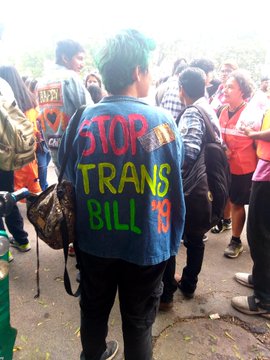On November 20th, 2019, paradoxically on the same day as the Transgender Day of Remembrance, the Rajya Sabha began debating the Government of India’s Transgender persons (Protection of Rights) Bill. After debating over its various provisions for four days, the bill was passed by the Upper House of the Parliament on Nov 26th, making it a law.
The Bill was first introduced by the NDA government in the previous Lok Sabha session in 2016, and was later sent to a Parliamentary Committe for recommendations. The government accepted some of the recommendations and the revised bill was passed by the Lok Sabha in December 2018. However, it could not be passed in the Rajya Sabha and as the country went for polls, the bill elapsed. After NDA came back to power, the bill was reintroduced and passed by the Lok Sabha in the monsoon session, without much discussion as the entire monsoon session was dominated by removal of Article 370 in Kashmir.
In both Bengaluru and Delhi Pride Marches, which happened on Nov 24th, participants carried posters and banner condemning the bill and asking the Parliament to not pass it. The bill violates the constitutional rights of trans persons by restricting their freedom of movement and residence to familial spaces and rehabilitation homes; it is discriminatory because it upholds much lighter penalties for sexual assault on transgender persons compared to cisgender persons; and it violates the NALSA judgment by framing a two-step process where transgender identity is first mandatorily granted by a District Magistrate with a requirement for surgery before one can change this to a binary gender marker.
A number of MPs in the Rajya Sabha spoke against the various provisions of the Bill. Tiruchi Siva of DMK and Rajeev Gowda of the Congress moved amendments as well, which were defeated. Derek O’Brien and Shanti Chhetri of AITC, Sasmit Patra of the BJD, Jharna Das Vaidya of the CPM, Wansuk Syiem, Ghulam Nabi Azad, Hanumanthaiah and Hussain Dalwai of the Congress Party, Vijila Satyanath of the AIADMK, Jaya Bacchan of the Samajwadi Party, Manoj Jha of the RJD, Sanjay Singh of AAP, Vandana Chavan of NCP, Binoy Viswam of CPI, P. Wilson of DMK, Amar Pattnaik of the BJD, all presented a unified argument for not passing the bill in its current form, and instead sending the bill to a select committee for making several necessary vital amendments.
As soon as news of the bill being passed by the Rajya Sabha was received, members of the LGBTQ community came out to protest. In Bengaluru, a protest was held at Town Hall on Nov 26th in the evening, while in Delhi people protested at Jantar Mantar.
Here are some of the most harmful aspects of the 2019 version of the Bill:
- This Bill upholds the humiliating process of submitting an application to District Magistrate for a legal recognition of one’s transgender identity, and it makes getting an ID as male or female dependent on first registering as transgender, and then supplying proof of surgery. This contradicts the NALSA judgment of the Supreme Court.
- The Bill postulates that sexual violence against trans persons will face punishment from 6 months to 2 years, in comparison with the 7 years of imprisonment for sexual violence against women. In this way, the Bill directly discriminates against the Trans, Intersex and GNC communities and strips us of dignity and equality
- The Trans Bill 2019 denied reservations and affirmative action for trans, intersex and gender nonconforming people in employment, education, and healthcare. Its provisions around discrimination have no penalties whatsoever, making their need completely redundant. Thus between not preventing discrimination and failing to provide any affirmative action on reservations, it puts lives and livelihoods at stake.
- The Bill requires Transgender people to reside with their birth family – even though birth families are often the first site of violence against these individuals, or approach the courts to live in a shelter home. Measures for “rehabilitation” are recommended in the bill. This violates the fundamental constitutional rights of free movement.
- A comprehensive anti-atrocities, anti discrimination legislation, that upholds and ensures equal access to all civil rights and spaces of housing, employment, education and medical care for transgender persons is necessary, not this watered down and dangerous piece of legislation.
- Submissions Open for Rainbow Awards for Literature & Journalism 2025 - June 6, 2025
- Daniel Craig’s “Queer” and Elliot Page’s “Close To You” to bookend Mumbai’s iconic LGBTQ+ film festival KASHISH 2025 - May 25, 2025
- Film Kuch Sapney Apne Celebrates Diversity and Family Acceptance, and Stars Parents and LGBTQ+ Members in Cast - February 25, 2025


